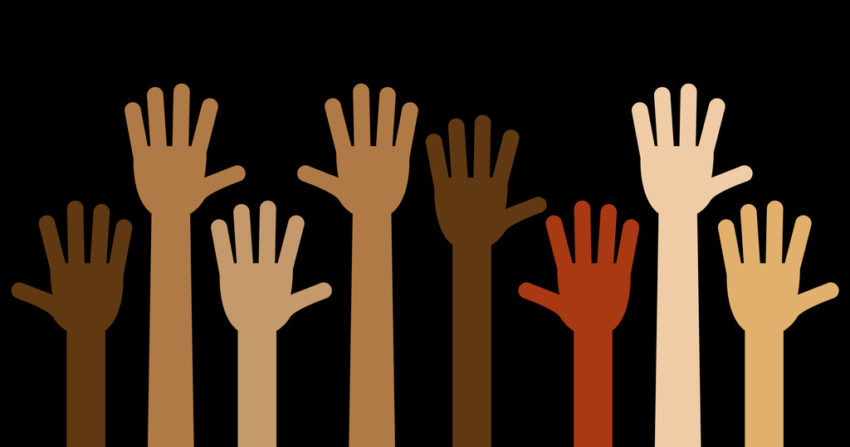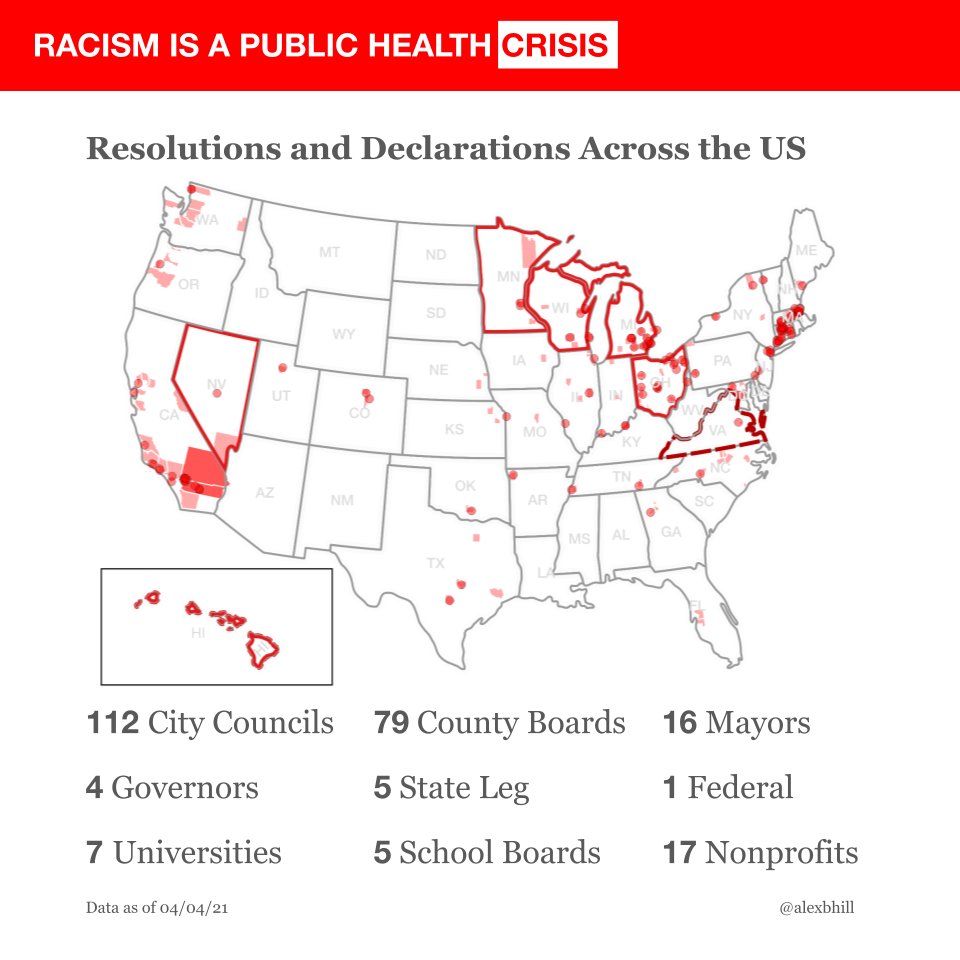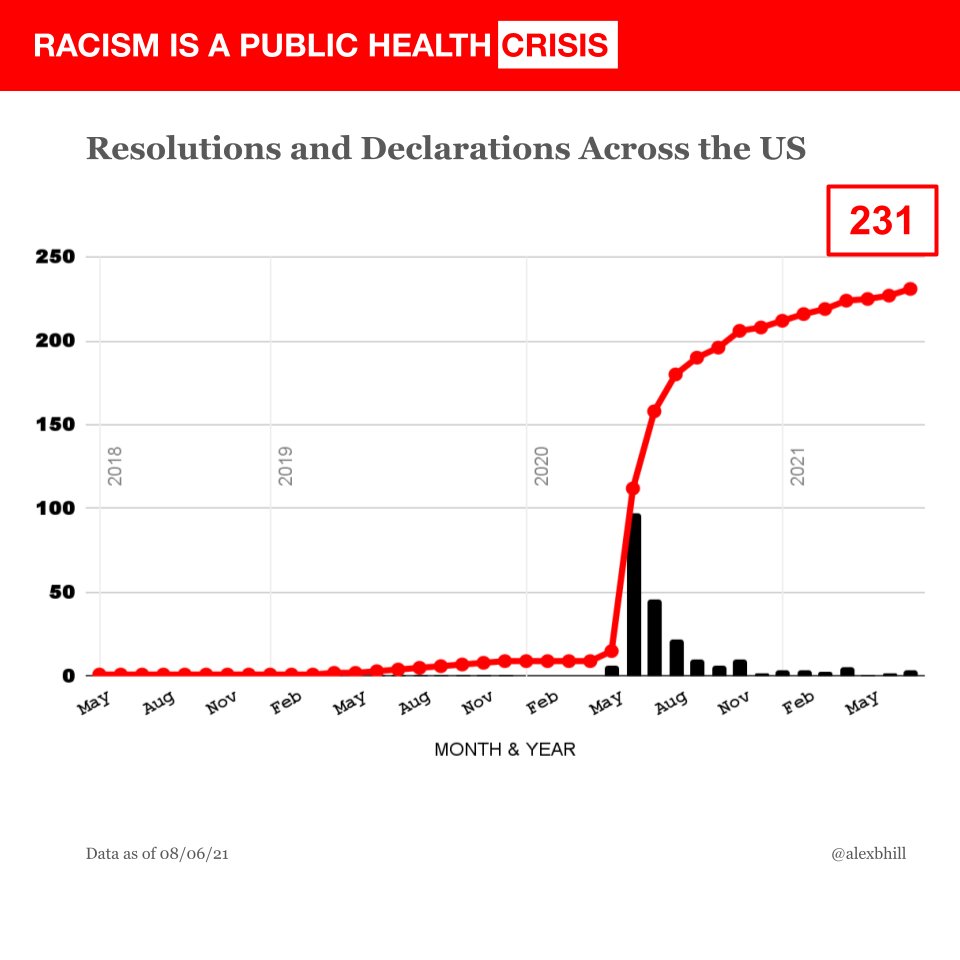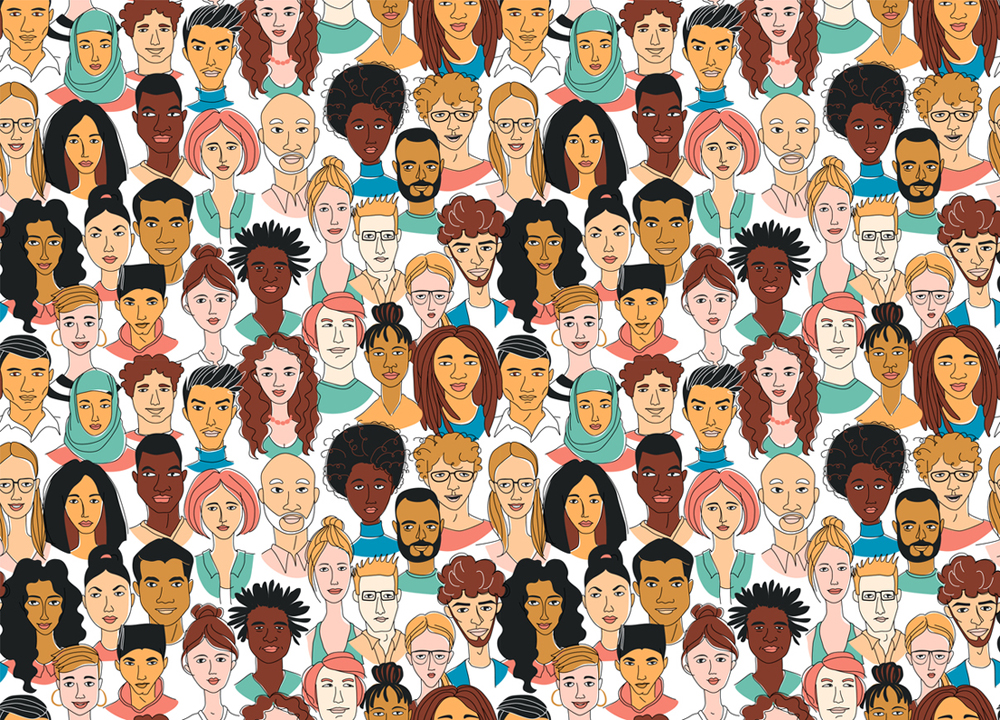
Share On Social!
Amid the ongoing racial justice movement in the wake of police brutality and the death of George Floyd and others, a rising number of U.S. local leaders are creating resolutions to declare racism a public health crisis.
Update 4/5/22: San Antonio, L.A., New York, and Chicago are among 246 cities, counties, and other governmental leaders that have declared racism a public health crisis, as of April 5, 2022, according to Michigan cartographer Alex B. Hill on Twitter.
“It’s a little thing to declare racism to be a public health crisis, but it’s a stake in the sand,” said former American Public Health Association (APHA) President Camara Phyllis Jones, Bloomberg reports.
Where Are Resolutions on Racism as a Public Health Crisis Happening?
Over 200 entities, including 19 states, have made resolutions/declarations on racism as a public health crisis, according to a comprehensive list with a map from APHA.
These include Arizona, California, Connecticut, Colorado, Florida, Georgia, Iowa, Illinois, Indiana, Iowa, Kentucky, Maine, Massachusetts, Maryland, Michigan, Minnesota, Missouri, Nevada, Nebraska, North Carolina, New York, New Jersey, Ohio, Oklahoma, Pennsylvania, Tennessee, Texas, Vermont, Washington, West Virginia, and Wisconsin. APHA lists 237 resolutions at all levels of government, as of April 5, 2022.

Here is a list of some of the entities, including several Latino-majority areas:
- San Bernardino County, Calif.
- Los Angeles, Calif.
- Oxnard, Calif.
- Denver, Colorado
- Dekalb County, Georgia
- Indianapolis City/Marion County, Indiana
- Cook County, Illinois
- Genessee County (Flint), Michigan
- Governor of State of Michigan
- Kansas City, Missouri
- Governor of State of Nevada
- Cleveland, Columbus, and Franklin County, Ohio
- Pittsburgh, Pennsylvania
- Memphis, Tennessee
- Austin, Texas
- Dallas County, Texas
- Salt Lake City, Utah
- Governor of State of Wisconsin
- Wheeling, West Virginia
In June 2020, the Network for Public Health Law explored 24 resolutions on racism as a public health crisis.

These resolutions make a clear declaration that racism is a public health crisis or emergency. Most also reference policy with a commitment to assess existing policy or procedure or to advocate for new policies that improve health in communities of color.
“The language of these resolutions, alone, cannot repair the health deficit American institutions have left for communities of color,” according to group. “However, these resolutions can jump start critical efforts to assess the barriers to health created by current laws.”
Hill’s map shows 246 places or leaders that have made these declarations or resolutions, as of April 5, 2022.
This includes Chicago (28.8% Latino), where Mayor Lori Lightfoot and city public health leaders declared racism a public health crisis on June 17, 2021.
San Antonio (64% Latino) approved its resolution on Aug. 20, 2020.
On Oct. 18, 2021, the New York Board of Health declared racism as a public health crisis.
In Buncombe County, N.C., government employees Zo Mpofu and Dakisha “DK” Wesley led the charge in helping local leaders pass three resolutions declaring racism a public health and public safety crisis.
They also created a Racial Equity Action Plan.
“One strategy in the equity action plan is that all policy systems changes, requests for budget, and ordinance updates have to go through an equity analysis tool to determine who benefits and who will be burdened,” Wesley said.
Why Are These Resolutions on Racism as a Public Health Crisis Happening?
Decades of unfair social, economic, and political systems have created inequitable communities that are disproportionately impacted by injury, disease, and premature death.
These unfair systems aren’t random. They are rooted in racism.
 Systemic racism makes it harder for Latinos and other people of color to get healthcare, housing, transportation, education, employment, healthy food, safe treatment by police, and more.
Systemic racism makes it harder for Latinos and other people of color to get healthcare, housing, transportation, education, employment, healthy food, safe treatment by police, and more.
Racism qualifies as a public health crisis.
Systemic racial injustices affect a large number of people. Injustices threaten health over the long-term. They also require the adoption of large-scale solutions.
Many health organizations agree.
The American Public Health Association finds racism to be a barrier to health equity. The American Psychological Association, the American Medical Association and the American Academy of Family Physicians also have declared hate crimes a public health concern.
In April 2021, CDC joined in calling racism a “serious threat” to public health, according to NBC News.
“It’s the right thing to do,” Rogelio Saenz, a professor of demography at the UT San Antonio, told the San Antonio Express-News.
How Can Your City Adopt a Resolution to Declare Racism a Public Health Crisis?
Download the Salud America! action pack, “Create a Meaningful Resolution on Racism as a Public Health Crisis.”
The action pack will help you connect with local advocates of color, draft a resolution, and start a conversation with local leaders. It will also help and build support for a resolution to declare racism a public health crisis and take action for more equitable policies and practices.
“A resolution to declare racism a public health crisis can help local leaders identify and equitably change policies and practices across the board with input from community social justice advocates,” said Dr. Amelie G. Ramirez, director of the Salud America! program and the Institute for Health Promotion Research at UT Health San Antonio, who created the new action pack with input from national justice advocates. “This can be an important first step toward lasting, meaningful change to improve health equity for people of color.”
By The Numbers
3
Big Excuses
people use to justify discriminatory behavior



